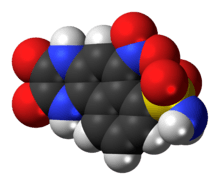NBQX
 | |
 | |
| Names | |
|---|---|
| IUPAC name
2,3-Dioxo-6-nitro-1,2,3,4-tetrahydrobenzo[f]quinoxaline -7-sulfonamide | |
| Identifiers | |
| 118876-58-7 | |
| 3D model (Jmol) | Interactive image |
| ChEMBL | ChEMBL222519 |
| ChemSpider | 2521927 |
| ECHA InfoCard | 100.149.984 |
| 4264 | |
| KEGG | C13667 |
| PubChem | 3272524 |
| |
| |
| Properties | |
| C12H8N4O6S | |
| Molar mass | 336.281 |
| Appearance | brown/red powder |
| Soluble to 100 mM in DMSO | |
| Except where otherwise noted, data are given for materials in their standard state (at 25 °C [77 °F], 100 kPa). | |
| | |
| Infobox references | |
NBQX (2,3-dihydroxy-6-nitro-7-sulfamoyl-benzo[f]quinoxaline-2,3-dione) is an AMPA receptor antagonist.
NBQX blocks AMPA receptors in micromolar concentrations (~10–20 µM) and also blocks kainate receptors. In experiments, it is used to counter glutamate excitotoxicity.[1] NBQX was found to have anticonvulsant activity in rodent seizure models.[2]
As the disodium salt, NBQX is soluble in water at high concentrations (at least up to 100 mM).[3]
See also
References
- ↑ Pitt, D.; Werner, P.; Raine, C. S. (2000). "Glutamate excitotoxicity in a model of multiple sclerosis". Nat Med. 6 (1): 67–70.
- ↑ Yamaguchi, S.; Donevan, S.D.; Rogawski, M.A. (1993). Anticonvulsant activity of AMPA/kainate antagonists: comparison of GYKI 52466 and NBOX in maximal electroshock and chemoconvulsant seizure models. Epilepsy Res. 15:179–184.
- ↑ Product information at Tocris
This article is issued from Wikipedia - version of the 2/27/2016. The text is available under the Creative Commons Attribution/Share Alike but additional terms may apply for the media files.